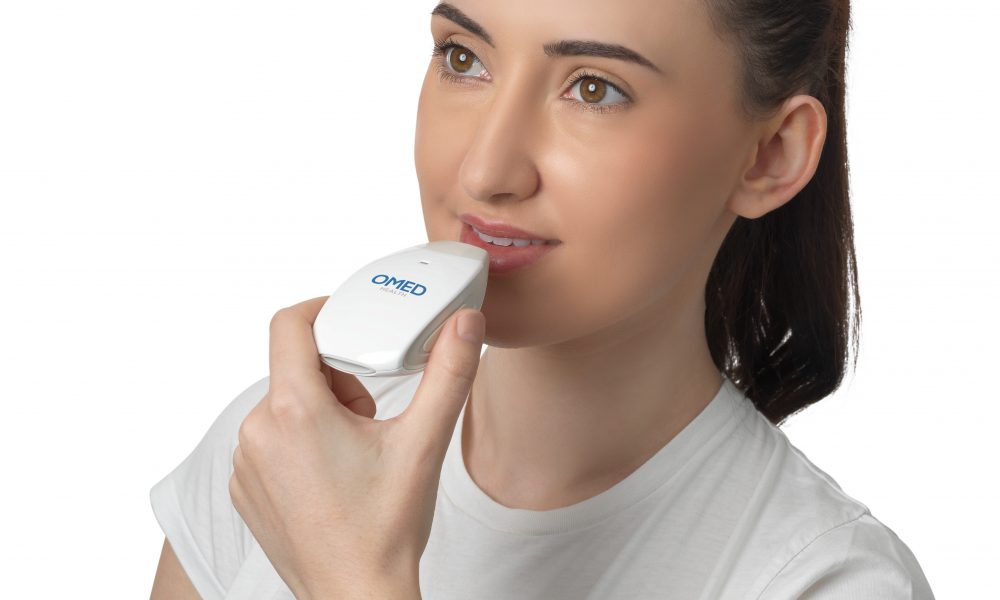IBS affects an estimated 1 in 10 people in the UK but the road to a diagnosis is long and winding.
Now, ground-breaking breath-based diagnostic tests could revolutionise the landscape.
It is estimated that at least 12 per cent of the UK population live with IBS.
But despite its prevalence, the landscape for diagnosis and treatment remains challenging for both patients and clinicians.
For many IBS patients, the treatment pathway is often long and arduous, taking an average of six years to receive an official diagnosis.
The lack of specific tests for the condition contributes to the delay.
And as the underlying causes of the condition can be complex, varying from patient to patient, determining what will work for each individual can be a shot in the dark.
With limited time at their disposal, GPs often lack the resources to identify the root problem, leaving patients to manage their symptoms alone.
But when symptoms of IBS can include abdominal pain, bloating, diarrhoea and constipation, the impact on people’s lives can be significant.
One study found that almost a quarter of patients with IBS had taken time off work as a result of their condition, making it the second most common cause of workplace absenteeism.
Additionally, mental health issues such as anxiety and depression can often accompany IBS, further exacerbating the burden on people’s lives.
The emergence of breath testing in IBS care
With an estimated 1 in 10 people living with IBS, new breath-testing technologies have emerged in recent years, seeking to speed up diagnosis and help clinicians identify underlying causes at the first point of care.
At this point, access to breath testing services remains limited, but as the technology develops, this is likely to change in the near future.
Earlier this year, the Cambridge-based biotech company Owlstone Medical launched a new brand, OMED Health, which is applying the company’s breath-testing technology to gastrointestinal and gut health.
“I think it’s difficult for doctors when they have very limited time with you in a GP surgery and when they have very limited tests or technology to try and find out the underlying cause,” said Billy Boyle, Owlstone Medical & OMED Health CEO.
“I think often what you’re trying to do is eliminate things like colorectal cancers. If it’s not that and if it is IBS, often you’re left to manage it yourself.
“What we’ve identified is there are a lot of people whose quality of life is severely impacted,” Boyle added.
“I think by having better technology tests and the support of clinicians, you can first identify what the underlying problem is, and that’s the first step to them resolving the problem.”
OMED Health’s breath-testing technology builds on Owlstone Medical’s experience in developing non-invasive breath-based diagnostics for various diseases, including cancers and respiratory disorders.
Now, OMED Health aims to pave the way for a more targeted and personalised approach to IBS diagnosis and treatment.
One particular challenge faced by clinicians is distinguishing between IBS and small intestinal bacterial overgrowth (SIBO), which is believed to account for 30 to 40 per cent of IBS cases.
Since the symptoms of both conditions are similar, differentiating between the two isn’t an easy task.
OMED Health aims to address this with the development of a test specifically designed to detect SIBO, along with other kits for identifying issues such as lactose and fructose intolerances.
“Personalisation is the key”
By providing clinicians with tools to identify the underlying causes of IBS, the journey to an accurate diagnosis could be significantly shortened.
In turn, this could open doors to more personalised and effective treatment options.
In the current landscape, there is a lack of personalised treatment in spite of the condition’s prevalence.
As Boyle explains, there is an “asymmetry” between the severity of symptoms and the quality of care being offered.
“The impact on the quality of life of the individual is very severe,” he said.
“It impacts every part of your life, at home and at work. I think from a healthcare system perspective if they are confident that is not something that’s going to kill you – like colorectal cancer – then from an outcomes perspective, that’s reasonable, but it’s not really helping the individual.
“There’s a need to work with the individual directly to say we’re here to support you to understand what’s going on.
“To get you on your treatment plan. It’s effectively going to be effective for you.
For many patients, managing their condition can come down to identifying foods that cause flare-ups and modifying their diet accordingly.
Other patients may respond better to antibiotics. Each patient will respond differently to different approaches which is why treating the condition is so complex, especially for an already strained health service.
“It’s not the fault of doctors or the NHS,” Boyle added. “You have this amazingly complex condition and an amazingly stretched healthcare system.
“I think that’s where technology and additional clinical support can help if it’s directed at individuals and the patient.
“It’s about trying to make these types of tests more accessible and put them at the front of the journey, rather than having to go through this long diagnostic odyssey that people have to go through today.”
From the clinic to the home
The technology behind OMED’s breath test is based on the detection of gases produced by bacteria in the gut.
To initiate the test, the patient first drinks a sugar-water mixture.
In the case of SIBO, if there is an overgrowth of bacteria in the small intestine, these bacteria will feed on the sugar substrate to produce hydrogen and methane.
These gases then enter the bloodstream and are expelled through breath.
Similar to an alcohol breathalyser, the presence of these gases indicates an imbalance in the microbiome, highlighting the underlying issue.
The first versions of the OMED kit can be ordered to the home and involve blowing into a test tube.
The sample is sent to the laboratory for analysis and later shared with the patient’s healthcare provider.
OMED is now working on taking the concept further to allow real-time monitoring of gut health via a smartphone app.
The next generation of the kit will feature a breathalyser device that is connected via Bluetooth to the patient’s smartphone which will make the data accessible to both patients and healthcare providers in real-time.
The integration of the breathalyser test with a smartphone app adds an extra layer of sophistication.
In addition to measuring the levels of gases in the breath, the app captures information about symptoms and dietary intake.
Together, these data points will allow for treatment plans to be fine-tuned for each individual.
“What’s interesting about this approach is that you can do this from your home,” Boyle said.
“You get a real-time result and you can also monitor how treatments are actually working for you as well.
“If you’re on an antibiotic or if you’re trying to modify your diet in some way, you can check your breath to see if it’s actually working for you.”
The company plans to conduct initial testing of the device and app in quarter 3 of this year, giving early users the opportunity to try the device ahead of its wider launch.
Easing the burden of IBS on the NHS
The aim of OMED is to empower patients to take a more active role in their gut health and provide clinicians with valuable data without needing to see the patient in person.
Traditionally, tests like these are carried out in a clinic and can take up to 2 hours to complete.
Aside from bringing tests to the home, what sets OMED apart, Boyd said, is the high accuracy of its results and the company’s approach to interpreting the data.
“There are two things that we think are super important,” Boyd explained.
“One, the device has to be very accurate.
“What we know from others that have attempted this in the past is if you don’t have the accuracy of measurement, you run the risk of giving the patient the wrong information.
“So that really builds on our expertise of excellence in accuracy.
“The other thing we believe is important is being able to interpret the data.
“I think in the past, patients have tried to […] you use tests or analyse these gases, but they don’t know what to do next.”
To provide this overarching clinical support, OMED has struck up partnerships with healthcare providers, such as the Functional Gut Clinic in Cambridge, to support patients through the treatment stage of their journey.
In addition to enhancing patient care, the breath test also holds the potential for cost savings.
The cost of IBS to the national health service is not clear, but new research from the University of Leeds estimates that the annual direct healthcare costs of IBS fall within the range of £1.3 to £2 billion.
Notably, the test minimises the unnecessary use of expensive drugs like rifaximin, the drug most commonly prescribed to people with SIBO.
Currently, the drug works in about 20 to 30 per cent of patients, but according to OMED, this figure rises to 60 to 70 per cent when a breath test is incorporated into the process.
“The promise of precision medicine becomes a reality,” Boyle said. “It also reduces costs because you only use those drugs with people that are much more likely to benefit from it.
“We know the NHS is under a lot of pressure.
If we’re able to provide novel technologies and clinical support that takes pressure off of them and helps the patient directly, it is the quintessential win-win for everyone.”
Looking to the future, OMED Health has been working with academic and pharmaceutical partners to explore additional compounds in the breath that are related to the microbiome.
While hydrogen and methane are already well-established markers in breath analysis, the company is investigating the inclusion of substances such as short-chain fatty acids and hydrogen sulfide in future iterations of the test.




